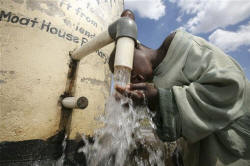 |
Other
News... sponsored by Richardson Repair & A-Plus Flooring |

 Zimbabwe: Cholera introduced by West
Zimbabwe: Cholera introduced by West
[December 13, 2008]
HARARE, Zimbabwe (AP)
--
The state-run Herald newspaper said comments by the U.S. ambassador that the U.S. had been preparing for the outbreak raised suspicions the West had waged "serious biological chemical war."
|
Zimbabwean officials often blame their country's troubles on the West. Their stranglehold on most sources of news to which ordinary Zimbabweans have access makes such rhetoric an important tool for a regime struggling to hold onto power. After the first cholera cases, U.S. and other aid workers braced for the waterborne disease to spread quickly in an economically ravaged country where the sewage system and medical care have collapsed. Zimbabwe also faces a hunger crisis, the world's highest inflation and shortages of both the most basic necessities and the cash to buy them. The Herald quoted the information minister, Sikhanyiso Ndlovu, as blaming cholera on "serious biological chemical war ... a genocidal onslaught on the people of Zimbabwe by the British." "Cholera is a calculated racist terrorist attack on Zimbabwe by the unrepentant former colonial power which has enlisted support from its American and Western allies so that they invade the country," Ndlovu was quoted as saying. Experts, however, blame the epidemic on Zimbabwe's economic collapse. The World Health Organization said Friday the death toll was at 792 and that the number of cholera cases that have been reported since the outbreak began in August was now 16,700. The epidemic has reached a fatality rate of 4.7 percent. To be under control it would have to be less than 1 percent, WHO spokeswoman Fadela Chaib said Friday. Aid agencies have warned that the outbreak could worsen with the onset of the rainy season and the disease has already spread to Zimbabwe's neighbors. President Robert Mugabe claimed Thursday that his government, with the help of international agencies, had contained the epidemic. That sparked accusations he was out of touch with his people's suffering. Zimbabwe's decline began in 2000, when Mugabe began an often violent campaign to seize white-owned farms and give them to blacks; most of the land ended up in the hands of his cronies, and production has dropped. Hungry Zimbabweans scrounge for corn kernels spilled from trucks carrying the harvest to market in a nation that once exported food. Zimbabwe once had among the best health care systems in sub-Saharan Africa. Now most hospitals have been forced to close their doors as they can no longer afford drugs, equipment or wages for their staff. Officials are also unable to afford spare parts and chemicals for water systems. Mugabe has ruled his country since its 1980 independence from Britain and refused to leave office following disputed elections in March. U.S. President George W. Bush, British Prime Minister Gordon Brown and French President Nicolas Sarkozy have called recently for the 84-year-old leader to step down. |

